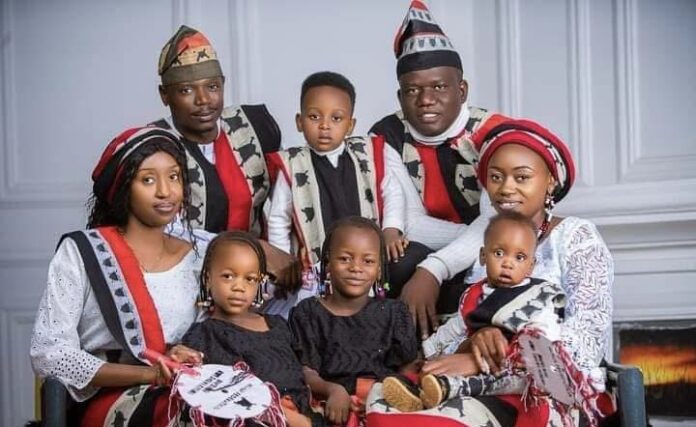The Kilba/Hoba People of Adamawa: Custodians of remarkable culture, history (pictures)
Found within the magnificent valleys of Adamawa State’s Hong Local Government Area, the Kilba people remain one of Nigeria’s most quietly fascinating ethnic groups.
Their history is steeped in migration, their culture rooted in resilience, and their traditions beautifully alive through ritual, language, and ancient practices. For the Kilba tribe, the past is a living force that continues to shape their identity and community. Their story is a bold blend of structure and spirituality, devotion and defiance.
History and Origin
The Kilba, also called Hoba, trace their ancestral roots to the Middle East and eventually the Mandara Hills before finally settling in the rugged terrain of present-day Adamawa State. These early settlers established themselves in various mountain communities, forming clan-based enclaves, each ruled by a Mountain King or Tul-Khoba.
By the mid-14th century, under the leadership of a unifier named Furkudil, the scattered mountain communities were consolidated into a centralised kingdom. The governance structure mirrored that of ancient kingdoms, with ministers responsible for justice, war, and spiritual affairs.
Despite the waves of Fulani incursions in the 19th century, the Kilba people were never conquered, a testament to their military strength and social cohesion.
Culture and Beliefs
At the heart of Kilba, life is a deep reverence for tradition and ancestry. Their language, ‘Huba’, is more than just a tool for communication; it is a vessel for storytelling, rituals, and ancestral memory. They view the world as spiritually charged, with rulers often doubling as religious heads.
Kilba communities historically organised themselves into tightly knit villages under local leaders, with ceremonial titles and defined roles. The council of elders and the King’s cabinet held sway over civil and spiritual life, ensuring that laws and customs were respected. Life revolved around farming, animal husbandry, and communal living. Each act, from planting millet to crafting a drum, was imbued with meaning.
READ ALSO: The Jukun Tribe: Into the enduring traditions of the mighty Kwararafa Kingdom (Pictures)
Marriage and Attire
Marriage among the Kilba people is a rich tapestry of social negotiation and festivity. Whether initiated through personal courtship, parental arrangement, every union must pass through certain cultural checkpoints.
Families investigate the prospective in-laws to ensure they aren’t linked to taboo histories; witchcraft, murder, slavery, or poisoning. Once cleared, the process begins in earnest.
One fascinating tradition is the Hanyi Makru, whereby a bride lives for three days in the groom’s family home before the marriage feast. This feast, considered the true deal of marriage, involves slaughtering a he-goat and hosting a night of music, dancing, and communal blessings. Even if all the rites are paid, without this process, the marriage remains unofficial, and another man could lawfully lay claim to the bride.
Traditional attire reflects the Kilba’s identity of colourfully woven garments, symbolic jewellery, and ceremonial ornaments often worn during festivals and rites of passage.
Economy and Festivals
Agriculture is the bedrock of Kilba’s economy. Blessed with fertile lands and mountainous shelter, they have long been skilled farmers and herders, cultivating grains like millet, guinea corn, and yams while raising cattle, goats, and poultry.
Trade is also central, with Kilba markets acting as cultural melting pots, especially during agreed truce days in history when even hostile neighbours would trade peacefully.
Their most prominent cultural celebration is the Tiwe festival. Spanning 120 days, Tiwe is more than a mourning period, it is a sacred journey of ancestral remembrance and spiritual renewal. With masks, music, chants and midnight processions, the festival transforms entire communities into sites of reverence and joy. It brings together generations, fuses history with performance, and asserts the continued vibrancy of Kilba’s identity in a rapidly modernising world.
READ ALSO: Guardians of Heritage: Glance at Bolawa tribe of Fika (Video)
Hence, in the hills of Adamawa, the story of the Kilba people is etched into every stone, sung in every drumbeat, and spoken in every household. More importantly, it is a story of balance between change and tradition, past and present, duty and celebration.
As Nigeria continues to evolve, the Kilba people stand as a powerful reminder that history is not just what happened—it’s what is still being lived, every day, in the quiet corners of the land.
See pictures below:






Follow the Neptune Prime channel on WhatsApp:
Do you have breaking news, interview request, opinion, suggestion, or want your event covered? Email us at neptuneprime2233@gmail.com





